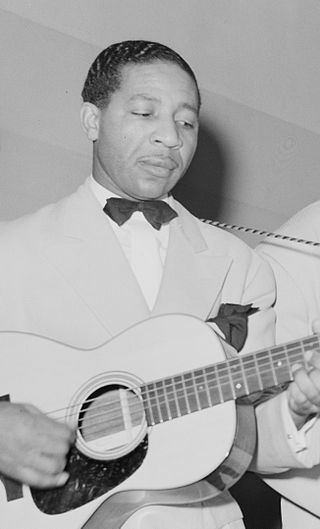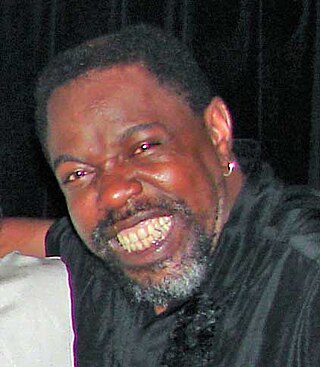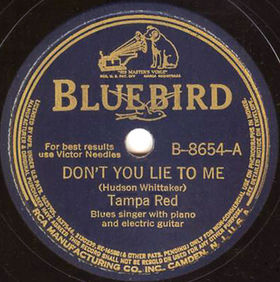
Slide guitar is a technique for playing the guitar that is often used in blues music. It involves playing a guitar while holding a hard object against the strings, creating the opportunity for glissando effects and deep vibratos that reflect characteristics of the human singing voice. It typically involves playing the guitar in the traditional position with the use of a slide fitted on one of the guitarist's fingers. The slide may be a metal or glass tube, such as the neck of a bottle, giving rise to the term bottleneck guitar to describe this type of playing. The strings are typically plucked while the slide is moved over the strings to change the pitch. The guitar may also be placed on the player's lap and played with a hand-held bar.

Alonzo "Lonnie" Johnson was an American blues and jazz singer, guitarist, violinist and songwriter. He was a pioneer of jazz guitar and jazz violin and is recognized as the first to play an electrically amplified violin.

Junior Wells was an American singer, harmonica player, and recording artist. He is best known for his signature song "Messin' with the Kid" and his 1965 album Hoodoo Man Blues, described by the critic Bill Dahl as "one of the truly classic blues albums of the 1960s". Wells himself categorized his music as rhythm and blues.

Freddie King was an American blues guitarist, singer and songwriter. He is considered one of the "Three Kings of the Blues Guitar". Mostly known for his soulful and powerful voice and distinctive guitar playing, King had a major influence on electric blues music and on many later blues guitarists.

Hudson Whittaker, known as Tampa Red, was an American Chicago blues musician.

"Killing Floor" is a 1964 song by American blues singer-songwriter and guitarist Howlin' Wolf. Called "one of the defining classics of Chicago electric blues", "Killing Floor" became a blues standard with recordings by various artists. It has been acknowledged by the Blues Foundation Hall of Fame, which noted its popularity among rock as well as blues musicians. English rock group Led Zeppelin adapted the song for their "The Lemon Song", for which Howlin' Wolf is named as a co-author.
"Have You Ever Loved a Woman" is a blues song written by Billy Myles and first recorded by American blues artist Freddie King in 1960. The song is performed as a slow 12-bar blues with King's vocal and guitar accompanied by a small combo of pianist Sonny Thompson, bassist Bill Willis, and drummer Phillip Paul.

Black Magic is a studio album by Chicago blues musician Magic Sam. Delmark Records released it under the name of "Magic Sam Blues Band" in November 1969, shortly before his death. The album was a follow-up to Magic Sam's highly influential studio debut, West Side Soul (1968), and also includes a mix of originals with songs written by his contemporaries.
"Wang Dang Doodle" is a blues song written by Willie Dixon. Music critic Mike Rowe calls it a party song in an urban style with its massive, rolling, exciting beat. It was first recorded by Howlin' Wolf in 1960 and released by Chess Records in 1961. In 1965, Dixon and Leonard Chess persuaded Koko Taylor to record it for Checker Records, a Chess subsidiary. Taylor's rendition quickly became a hit, reaching number thirteen on the Billboard R&B chart and number 58 on the pop chart. "Wang Dang Doodle" became a blues standard and has been recorded by various artists. Taylor's version was added to the United States National Recording Registry in 2023.

Lurrie Bell is an American blues guitarist and singer. His father was renowned blues harmonica player Carey Bell.

Hoodoo Man Blues is the debut album of blues vocalist and harmonica player Junior Wells, performing with the Junior Wells' Chicago Blues Band, an early collaboration with guitarist Buddy Guy. Released on LP by Delmark Records in November 1965, the album has been subsequently reissued on CD and LP by Delmark and Analogue Productions.

"It Hurts Me Too" is a blues standard, regarded as one of the most interpreted songs in the genre. First recorded in 1940 by Tampa Red, the song is a mid-tempo eight-bar blues that features slide guitar. It borrows from earlier blues songs and has been recorded by many artists.

"Every Day I Have the Blues" is a blues song that has been performed in a variety of styles. An early version of the song is attributed to Pinetop Sparks and his brother Milton. It was first performed in the taverns of St. Louis by the Sparks brothers and was recorded July 28, 1935 by Pinetop with Henry Townsend on guitar. The song is a twelve-bar blues that features Pinetop's piano and falsetto vocal. The opening verse includes the line "Every day, every day I have the blues".

"Crosscut Saw", or "Cross Cut Saw Blues" as it was first called, is a hokum-style song "that must have belonged to the general repertoire of the Delta blues". Mississippi bluesman Tommy McClennan's recording of the song was released in 1941 and has since been interpreted by many blues artists. "Crosscut Saw" became an early R&B chart hit for Albert King, "who made it one of the necessary pieces of modern blues".

"Look on Yonder Wall" is a blues song first recorded in 1945 by James "Beale Street" Clark. Clark, also known as "Memphis Jimmy", was a blues pianist from Memphis, Tennessee. During the 1940s, he appeared on recordings by Jazz Gillum, Red Nelson, and an early Muddy Waters session, as well as several singles in his own name.

Freddy King Sings is an album by blues singer and guitarist Freddie King. Released in 1961, it was King's first album and includes four singles that appeared in Billboard magazine's R&B and Pop charts. In 2008, Freddy King Sings was inducted into the Blues Foundation Hall of Fame in the "Classics of Blues Recordings" category.

"You Don't Love Me" is a rhythm and blues-influenced blues song recorded by American musician Willie Cobbs in 1960. Adapted from Bo Diddley's 1955 song "She's Fine She's Mine", it is Cobbs' best-known song and features a guitar figure and melody that has appealed to musicians in several genres.

"Don't You Lie to Me" is a song recorded by Tampa Red in 1940. It became popular with blues artists, leading it to become a blues standard. The song was also interpreted by rock and roll pioneers Fats Domino and Chuck Berry.
"Early in the Morning" is a blues song that was recorded by Sonny Boy Williamson I in 1937. Identified as one of his most successful and influential tunes, it was inspired by earlier blues songs. "Early in the Morning" has been recorded by various musicians, including Junior Wells, who made it part of his repertoire.

Pleading the Blues is an album by Chicago blues harp player Junior Wells.

















